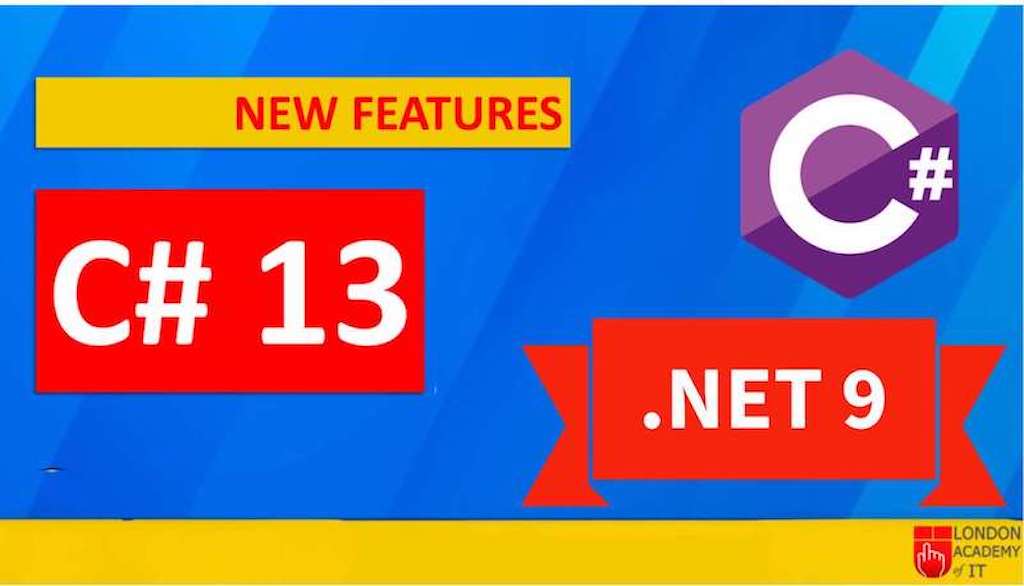Thursday 05 September 2024, by Moshiur Rahman

C# continues to evolve, and with the upcoming C# 13, Microsoft is focusing on enhancing flexibility, boosting performance, and refining some of the language's most beloved features. At this year’s Microsoft Build, we got a sneak peek at what’s in store, and now, we're excited to share an update on what you can expect from C# 13. Whether you’re looking to experiment with the latest features or just stay informed, this blog will guide you through the highlights of what’s coming in C# 13.
Getting Started with C# 13
Ready to try out C# 13? You can access the latest preview features by updating your project’s language version to preview and targeting .NET 9. Here's how to do it:
xml
Copy code
<Project Sdk="Microsoft.NET.Sdk">
<PropertyGroup>
<LangVersion>preview</LangVersion>
<TargetFramework>net9.0</TargetFramework>
</PropertyGroup>
</Project>
This setup lets you explore all the new features and provide feedback to the development team as they refine the final release.
A Glimpse of What’s New in C# 13
C# 13 is packed with enhancements that make your coding experience more powerful and intuitive. Here’s a closer look at some of the standout features:
1. Enhanced params Collections for Greater Flexibility
In C# 13, the params keyword has been extended to support any type that can be constructed via a collection expression. This update adds flexibility to how you define and call methods with params, allowing for more complex and dynamic parameter handling.
Example:
public void AddItems(params List items)
{
Console.WriteLine(String.Join(", ", items));
}
// Usage
AddItems(new List { 1, 2, 3 });
AddItems(4, 5, 6);
This feature is especially useful when working with LINQ expressions, making it easier to pass dynamic collections as parameters.
2. Improved Lock Object Management
C# 13 introduces a new System.Threading.Lock type, offering a more efficient alternative to locking on an arbitrary object. This new type simplifies mutual exclusion, making your multithreaded code faster and more reliable
.
Example:
public class MyResource
{
private System.Threading.Lock _lock = new System.Threading.Lock();
public void UseResource()
{
lock (_lock)
{
// Resource-intensive work here
}
}
}
By switching from object to System.Threading.Lock, you leverage the latest runtime improvements with minimal changes to your code.
3. Index Operator Enhancements
The index operator (^) allows you to reference elements from the end of a collection, and C# 13 now supports using this operator within collection initializers. This makes your code cleaner and more expressive.
Example:
var numbers = new int[10] { 1, 2, 3, 4, 5, 6, 7, 8, 9, 10 };
numbers[^1] = 99; // Sets the last element to 99
This improvement is a small but valuable addition that enhances readability and reduces potential off-by-one errors.
4. New Escape Sequence \e
For developers who work with terminal output, C# 13 introduces the \e escape sequence, representing the ESCAPE character. This change simplifies working with ANSI escape codes, making your code cleaner and less error-prone.
Example:
Console.WriteLine("\e[1mBold Text\e[0m"); // Outputs bold text in the terminal
This new escape sequence is particularly handy when creating command-line applications with rich text formatting.
5. Partial Properties
Following in the footsteps of partial methods, C# 13 introduces partial properties, designed primarily to support source generators. This feature allows you to define parts of a property across multiple files, improving code organization and maintainability.
Example:
[GeneratedRegex(“abc|def")]
private static partial Regex Pattern { get; };
Partial properties are a great tool for developers who rely on source generators, enabling cleaner and more modular code.
6. Refined Method Group Types
C# 13 brings improvements to how the compiler determines the natural type of method groups. This enhancement reduces the chance of compiler errors, especially when working with method groups assigned to variables or passed as delegates.
Example:
Func square = x => x * x;
var result = square(5); // Uses the natural type Func
This update streamlines method group usage, making your code more intuitive and less prone to errors.
7. Ref and unsafe in Async Methods and Iterators
C# 13 allows ref and unsafe contexts within async methods and iterators, broadening the scope of what you can do in asynchronous programming. This change enables more efficient and flexible code, particularly in performance-critical applications.
Example:
async Task ProcessDataAsync()
{
ref int value = ref GetData();
// Unsafe operations can now be performed here
}
This improvement is a significant boost for developers who need fine-grained control over memory and performance in async methods.
Conclusion
C# 13 is shaping up to be another exciting release with features that enhance flexibility, performance, and usability. Whether you're excited about the new params enhancements, eager to experiment with partial properties, or looking forward to the next big thing with Extension Types, there’s something in C# 13 for every developer. Keep an eye on the official release notes and the Roslyn Feature Status page to stay up to date with the latest developments.
Happy coding!